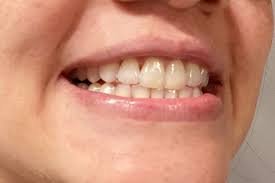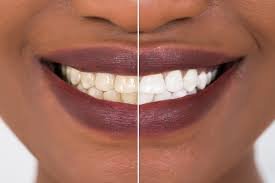Teeth whitening is a popular and effective way to brighten your smile, but for those with sensitive teeth, the process can seem daunting. If you have sensitive teeth, you may be concerned about discomfort or pain during or after a whitening treatment. Fortunately, there are ways to achieve a brighter smile without compromising comfort. In this post, we will explore how teeth whitening affects sensitive teeth, what causes tooth sensitivity, and the best options to whiten teeth while minimizing discomfort.

1. Understanding Tooth Sensitivity
Before diving into whitening options, it’s important to understand what tooth sensitivity is and what causes it. Sensitive teeth occur when the enamel (the protective outer layer of the tooth) wears down or when the gums recede, exposing the underlying dentin. Dentin contains tiny tubules that lead to the nerves of the tooth, and when they are exposed to hot, cold, sweet, or acidic foods and drinks, they can cause discomfort or pain.
Common Causes of Tooth Sensitivity:
- Enamel Erosion: Over time, enamel can wear down due to brushing too hard, consuming acidic foods or drinks, or natural aging.
- Gum Recession: When gums recede, the tooth root is exposed, leading to heightened sensitivity.
- Tooth Decay: Cavities or cracks in the teeth can also lead to sensitivity.
- Teeth Whitening: While whitening treatments are effective, they can temporarily cause sensitivity, especially if the enamel is already compromised.
Why This Is Important:
- Sensitivity Awareness: Knowing what causes sensitivity helps you take steps to minimize discomfort during teeth whitening.
2. How Teeth Whitening Affects Sensitive Teeth
Teeth whitening works by using bleaching agents, typically hydrogen peroxide or carbamide peroxide, to break down stains and brighten the enamel. However, these agents can also cause temporary sensitivity, especially in individuals with already sensitive teeth. When the whitening gel comes into contact with the enamel, it may penetrate the surface and reach the nerve endings, leading to discomfort or heightened sensitivity.
Effects of Teeth Whitening on Sensitive Teeth:
- Temporary Sensitivity: Most whitening treatments cause short-term sensitivity, which typically lasts only a few hours to a day after the procedure.
- Increased Discomfort: For individuals with pre-existing sensitivity, the discomfort can be more noticeable and last longer.
- Frequency Matters: The more frequently you whiten your teeth, the higher the likelihood of experiencing sensitivity.
Why This Is Important:
- Managing Expectations: It’s essential to understand that sensitivity from whitening is usually temporary and can be managed with the right precautions.
3. Choosing the Right Whitening Option for Sensitive Teeth
If you have sensitive teeth, you don’t have to give up on getting a whiter smile. There are several whitening options available that are specifically designed to minimize discomfort while still providing excellent results.
Best Whitening Options for Sensitive Teeth:
- Sensitivity-Specific Whitening Products: Some over-the-counter whitening toothpaste or gels are formulated for sensitive teeth. These products contain lower concentrations of bleaching agents and additional ingredients to help soothe the teeth.
- Professional Whitening Treatments: Your dentist can offer professional whitening treatments that are gentler on sensitive teeth. They may use products with a lower concentration of peroxide or apply a desensitizing agent before or after the treatment to reduce discomfort.
- Custom Whitening Trays: Custom-made trays from your dentist allow for a more controlled application of the whitening gel, which can help reduce sensitivity. These trays fit perfectly to your mouth, ensuring even and gentle whitening.
- Whitening Strips for Sensitive Teeth: Some whitening strips are specifically designed for individuals with sensitive teeth. These strips typically have a lower concentration of bleaching agents to minimize irritation.
Why This Is Important:
- Tailored Solutions: Choosing the right whitening option tailored to sensitive teeth ensures that you can enjoy a brighter smile without unnecessary discomfort.
4. Tips for Minimizing Sensitivity During Teeth Whitening
There are several strategies you can use to reduce the risk of sensitivity during or after a whitening treatment. These tips can help make the process more comfortable and ensure that you achieve the best results without unnecessary pain.
Helpful Tips:
- Use a Soft-Bristled Toothbrush: Brush gently with a soft-bristled toothbrush to avoid irritating sensitive teeth and gums before whitening.
- Avoid Whitening Too Often: Limit the frequency of whitening treatments to prevent over-sensitivity. Giving your teeth time to recover between treatments can help minimize discomfort.
- Desensitizing Toothpaste: Use a desensitizing toothpaste before and after whitening. These products are formulated to block pain signals from the nerves in your teeth.
- Take Breaks During Whitening: If you’re using an at-home whitening product, take breaks during the process to avoid prolonged exposure to the bleaching agent.
- Avoid Hot or Cold Foods: After whitening, try to avoid consuming hot or cold foods and drinks for at least 24 hours to reduce sensitivity.
Why This Is Important:
- Comfort and Safety: These tips can help reduce sensitivity and ensure that the whitening process is as comfortable as possible.
5. Post-Treatment Care for Sensitive Teeth
Once your whitening treatment is complete, taking good care of your teeth can help prevent or alleviate any lingering sensitivity. Post-treatment care is key to maintaining the results while keeping your teeth healthy and comfortable.
Post-Treatment Tips:
- Use a Fluoride Rinse: A fluoride mouthwash can help strengthen the enamel and reduce sensitivity.
- Stay Hydrated: Drinking plenty of water helps keep your mouth hydrated and reduces the risk of discomfort.
- Avoid Acidic Foods: Stay away from acidic foods and drinks (like citrus fruits or vinegar) for a day or two after whitening to avoid aggravating sensitivity.
- Regular Follow-Ups with Your Dentist: If sensitivity persists or becomes problematic, visit your dentist for advice or a professional treatment to alleviate the discomfort.
Why This Is Important:
- Reducing Discomfort: Proper post-treatment care helps minimize any lasting sensitivity and ensures that your teeth stay healthy and comfortable.
Conclusion
Teeth whitening can be an effective way to achieve a brighter smile, even for those with sensitive teeth. By understanding the causes of sensitivity and choosing the right whitening methods, you can enjoy a whiter smile without the discomfort. Whether you opt for professional treatments, at-home products, or use desensitizing strategies, there are plenty of options available to meet your needs. With the right care and precautions, you can maintain your white smile while keeping your teeth comfortable and healthy.







